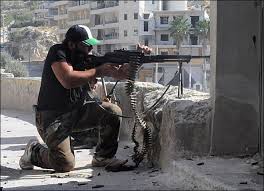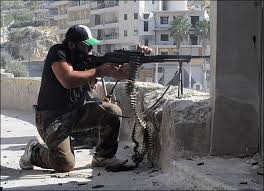
US would dispatch 250 special force soldiers to help local militia to build on successes against Islamic State is what is the biggest expansion of U.S. ground troops in Syria since the civil war there began, said the US President Barack Obama on Monday.
The U.S. forces in Syria would be increased by six-fold to about 300 by the new deployment. Defense experts said it could help shift the momentum in Syria by giving more Syrian fighters on the ground access to U.S. close air support even though the total U.S. ground force is still small by comparison to other American deployments.
The move followed on victories over Islamic State that clawed back territory from the hard-line Sunni Islamist group, said Obama while announcing the decision in Germany at the end of a six-day foreign tour.
"Given the success, I've approved the deployment of up to 250 additional U.S. personnel in Syria, including special forces to keep up this momentum," Obama said in a speech at a trade fair in the northern city of Hanover.
"They're not going to be leading the fight on the ground, but they will be essential in providing the training and assisting local forces as they continue to drive ISIL back," he added.
The US campaign's effectiveness in Syria has been limited by a lack of allies on the ground in a country where a complex, multi-sided civil war has raged for five years even though the U.S. military has led an air campaign against Islamic State since 2014 in both Iraq and Syria.
The Russian air campaign in Syria last year has been more effective because it is closely coordinated with the government of President Bashar al-Assad. He is Moscow's ally but a foe of the United States.
A Kurdish force known as the YPG, who wrested control of much of the Turkish-Syrian border from Islamic State has been the main ally for Washington on the ground. Since the U.S. ally Turkey is deeply hostile to the YPG, the alliance has assumed a complex shape.
“Presumably these are going to assist our Kurdish YPG friends to widen and deepen their offensive against IS in northeastern Syria,” Tim Ripley, defense analyst and writer for IHS Janes Defence Weekly magazine, said.
“You can provide more advisers to more units, to allow more units to receive close air support,” Ripley said, of the new U.S. deployment. “The more people you have, the more militia groups can have close air support that makes them more effective so they can advance in more areas,” Ripley added.
It welcomed Obama's announcement but still wanted more help, said he Syria Democratic Forces, a U.S.-backed coalition set up in October to unite the Kurdish YPG and some Arab allies.
"Any support they offer is positive but we hope there will be greater support. So far we have been supplied only with ammunition, and we were hoping to be supplied with military hardware ...," SDF spokesman Talal Silo said.
(Source:www.reuters.com)
The U.S. forces in Syria would be increased by six-fold to about 300 by the new deployment. Defense experts said it could help shift the momentum in Syria by giving more Syrian fighters on the ground access to U.S. close air support even though the total U.S. ground force is still small by comparison to other American deployments.
The move followed on victories over Islamic State that clawed back territory from the hard-line Sunni Islamist group, said Obama while announcing the decision in Germany at the end of a six-day foreign tour.
"Given the success, I've approved the deployment of up to 250 additional U.S. personnel in Syria, including special forces to keep up this momentum," Obama said in a speech at a trade fair in the northern city of Hanover.
"They're not going to be leading the fight on the ground, but they will be essential in providing the training and assisting local forces as they continue to drive ISIL back," he added.
The US campaign's effectiveness in Syria has been limited by a lack of allies on the ground in a country where a complex, multi-sided civil war has raged for five years even though the U.S. military has led an air campaign against Islamic State since 2014 in both Iraq and Syria.
The Russian air campaign in Syria last year has been more effective because it is closely coordinated with the government of President Bashar al-Assad. He is Moscow's ally but a foe of the United States.
A Kurdish force known as the YPG, who wrested control of much of the Turkish-Syrian border from Islamic State has been the main ally for Washington on the ground. Since the U.S. ally Turkey is deeply hostile to the YPG, the alliance has assumed a complex shape.
“Presumably these are going to assist our Kurdish YPG friends to widen and deepen their offensive against IS in northeastern Syria,” Tim Ripley, defense analyst and writer for IHS Janes Defence Weekly magazine, said.
“You can provide more advisers to more units, to allow more units to receive close air support,” Ripley said, of the new U.S. deployment. “The more people you have, the more militia groups can have close air support that makes them more effective so they can advance in more areas,” Ripley added.
It welcomed Obama's announcement but still wanted more help, said he Syria Democratic Forces, a U.S.-backed coalition set up in October to unite the Kurdish YPG and some Arab allies.
"Any support they offer is positive but we hope there will be greater support. So far we have been supplied only with ammunition, and we were hoping to be supplied with military hardware ...," SDF spokesman Talal Silo said.
(Source:www.reuters.com)





